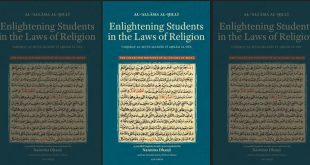well-known work in Imamiyya fiqh (jurisprudence), written by Abu al-Qāsim Najm al-Din Jaʾfar b. Hasan Hilli, known as Muhaqiq al-Ḥillī or al-Muḥaqiq al-Awwal (d. 676 AH/ 1277).
The book has always been the focus of attentions and one of the textbooks of Islamic seminary schools in fiqh. There are many commentaries on this book.
Shara’i’ is a comprehensive book of Islamic jurisprudence on all matters, including over 12,000 problems in all areas of fiqh. The book has been a center of discussions and a textbook in Shiite seminary schools for more than 750 years. This work is usually cited in the subsequent works.
Al-Muhaqiq al-Hilli wrote this book in 670 AH (1272) at the request of one of his pupils called Mahmud b. Muhammad or Muhammad b. Mahmud al-Zahidi al-Khayyaṭ al-Halabi.
The book has taken center stage in Shiite jurisprudence for centuries because of its particular features, such as its clear writing, its precision, its brevity, its style of presenting the problems and issues, and its concern for faithful quotations and formulations of different views. There are many commentaries and notes on Shara’i’ al-Islam which shows its extraordinary significance.
Some people say that if one reads this book completely, he will be rewarded a pilgrimage to Mecca by God.
Shara’i’ has four main parts as follows:
1. Worships (ʾibādāt), including ten books: ritual cleanness (ṭahāra), prayers (ṣalāt), zakat (an obligatory Islamic tax on certain goods and products), khums (the obligation of paying one fifth of one’s annual benefits), ṣawm (fasting), iʾtikāf (the practice of temporary retreat in a mosque for few days), hajj (obligatory pilgrimage to Mecca), ʾumra (non-obligatory pilgrimage to Mecca), jihad, enjoining the right and forbidding the wrong (al-amr bi al-maʾrūf wa al-nahy ʾan al-munkar).
2. Contracts (al-ʾuqūd), including 18 books: transaction (tijara), mortgage (rahn), iflās (bankruptcy or inability to pay one’s debts), ḥijr (being ward), guarantee (ḍamān)—including drafts (ḥawāla) and bails (kifāla), compromise (ṣulḥ), partnership (shirka), muḍāraba (a kind of partnership in which one party provides the fund or capital, and other contributes by his work), muzāraʾa (a kind of agricultural partnership in which one party provides lands for farming, and the other works as a farmer), musāqāt (a sort of contract in which one party takes care of the other party’s trees and garden, especially by water supply, and then they share the products as agreed upon), deposit (wadīʾa), borrowing and loaning a property (ʾārīya), renting (ijāra), wikala (agency), waqf (a sort of religious endowment of lands or any property), gift (hiba), sabq and ramāya (overtaking by a horse in a match and shooting in a match in order to prepare for wars), will and testament (waṣiyya), and marriage (nikāḥ).
3. Unilateral obligations (īqāʾāt), including 10 books: divorce (ṭalāq), ẓihār (a sort of divorce in Arabia before Islam that is forbidden by the Quran), īlāʾ (a practice in Arabia that is forbidden in Islam: the husband swears that he will never have intercourse with his wife, without divorcing her, in order to hurt her), liʾān (mutual curse: in some conditions when the husband accuses his wife of adultery and there is no one to testify on this claim, the husband and the wife should curse each other, and then they will be separated forever and can never marry again), ʾitq (emancipation of slaves and bondwomen), tadbīr (the owner wills that his slave be emancipated after his death), mukātaba (a sort of contract between a slave and his owner to the effect that the slave might be emancipated by paying certain amount of money), istīlāʾ (if a bondwoman has a child from her owner, she will be emancipated after her owner’s death), iqrār (to acknowledge something not to one’s own benefit), juʾāla (a commitment to certain fee in exchange with a work), aymān (oaths), and nadhr (vow).
4. Verdicts (aḥkām) including: hunting (ṣayd) and dhabāḥa (slaughtering or exsanguination), foods and beverages (al-aṭʾima wa al-ashriba), usurpation or expropriation (ghaṣb), shufʾa (preemption, that is, the priority of a person to purchase the shares of his partner if he wants to sell them), restoration of wastelands (iḥyaʾ al-mawāt), luqaṭa (lost property), farāʾiḍ (verdicts concerning heritage), judgeship (qaḍāʾ), testimonies (shahādāt), ḥudūd and taʾzīrāt (certain punishments for violating some Islamic laws), qiṣāṣ (the killing of a murderer at the request of the victim’s family), and dīāt (blood money).
Besides this, al-Muhaqiq al-Hilli strctures each section with first mentioning the obligations (wājib), and then supererogatory (mustaḥab) actions, then detestable ones (makrūh), and finally forbidden (muḥarram) ones.
 Ijtihad Network Being Wise and Faithful Muslim in the Contemporary World
Ijtihad Network Being Wise and Faithful Muslim in the Contemporary World


Salam alaikum, is there a possibility to download the other Volumes as well?